高考英语语法专项 状语从句
- 格式:doc
- 大小:66.50 KB
- 文档页数:5
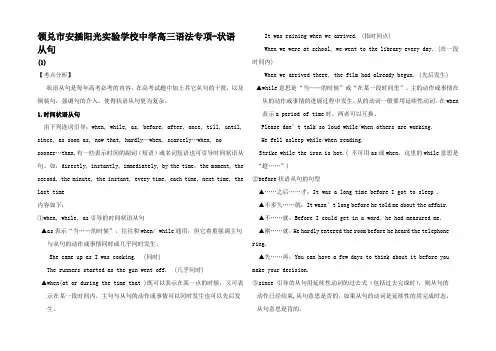
领兑市安插阳光实验学校中学高三语法专项-状语从句(1)【考点分析】状语从句是每年高考必考的内容,在高考试题中加上其它从句的干扰,以及倒装句,强调句的介入,使得状语从句更为复杂。
1.时间状语从句由下列连词引导:when, while, as, before, after, once, till, until, since, as soon as, now that, hardly…when,scarcely…when, no sooner…than,有一些表示时间的副词(短语)或名词短语也可引导时间状语从句。
如:directly, instantly, immediately, by the time,the moment, the second, the minute, the instant, every time, each time, next time, the last time内容如下:①when, while, as引导的时间状语从句▲as表示“当……的时候”,往往和when/ while通用,但它着重强调主句与从句的动作或事情同时或几乎同时发生。
She came up as I was cooking. (同时)The runners started as the gun went off. (几乎同时)▲when(at or during the time that )既可以表示在某一点的时候,又可表示在某一段时间内,主句与从句的动作或事情可以同时发生也可以先后发生。
It was raining when we arrived. (指时间点)When we were at school, we went to the library every day. (在一段时间内)When we arrived there, the film had already begun. (先后发生)▲while意思是“当……的时候”或“在某一段时间里”。
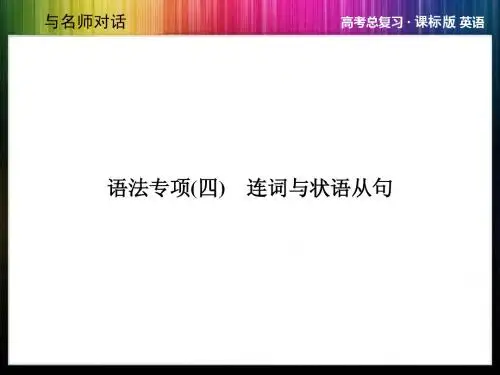
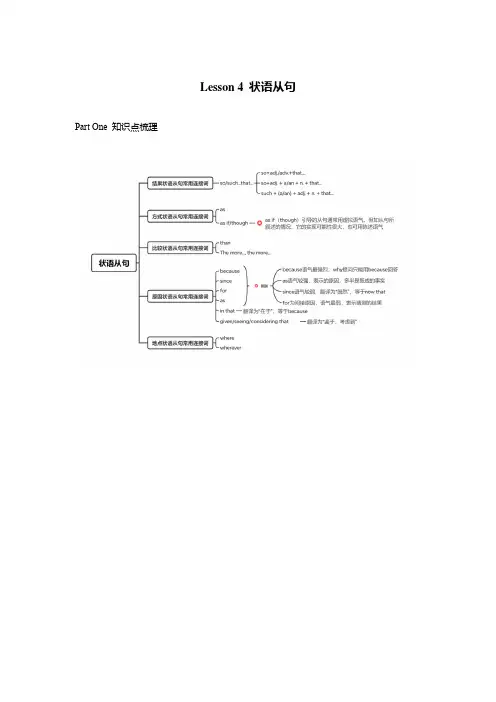
Lesson 4 状语从句Part One 知识点梳理Part Two 语法点练习1. __________ we win or lose, we are going to do our best.Whether2. Try to buy less __________ unnecessary shopping could become another source of pressure to the environment.because3. He is so good a teacher __________ all the students in our school love and respect him. that4. __________ you taste the noodles, you will never forget their delicious flavour.Once5. I was about to pick up the receiver _________ the phone stopped ringing, which annoyed me a lot.when6. He wouldn’t give up smoking __________ the doctor told him it was a matter of life and death.until7. The hole is not expected to pose any danger to humans __________ it moves further south. unless8. I can’t figure out why some foreigners must go out __________ staying at home is the safest way during the outbreak of the virus.when9. __________ amusing the story is, I have to put it away and focus my attention on study this week.However10. Scientists say it may be five or six years __________ it is possible to test this medicine on human patients.before11. The school rules state that no child shall be allowed out of the school during the day, __________ accompanied by an adult.unless12. Much __________ I have traveled, I have never seen anyone who's as capable as John.as/though13. Tell your doctor with a detailed medical history __________ __________ he can give you the accurate treatment.so that14. It is recommended that the exploration team take with them an extra set of equipment __________ __________ unexpected emergency occurs.in case15. In time of serious accidents, ___________ ___________ ___________ we know some basic things about first aid, we can save lives.as long as16. We started early __________ __________ __________ we might arrive before dark.in order that17.__________ __________ he realized that reaching the goal was difficult, he did not give up halfway.Even though18.__________ __________ __________ sales strategy it adapts, the project intended to cheat teenagers is sure to collapse itself.No matter whatPart Three 经典例句分析写出下列状语从句的连词及引导的状语从句类型1. before引导的时间状语从句Even dairy farms, where robots do a small share of milking, have a long way to go before they are automated.译文:即使是机器人只做一小部分挤奶工作的奶牛场,要实现自动化也还有很长的路要走。
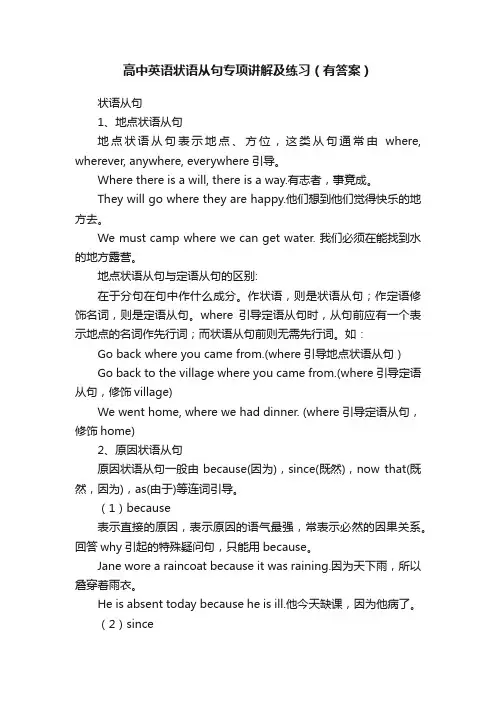
高中英语状语从句专项讲解及练习(有答案)状语从句1、地点状语从句地点状语从句表示地点、方位,这类从句通常由where, wherever, anywhere, everywhere引导。
Where there is a will, there is a way.有志者,事竟成。
They will go where they are happy.他们想到他们觉得快乐的地方去。
We must camp where we can get water. 我们必须在能找到水的地方露营。
地点状语从句与定语从句的区别:在于分句在句中作什么成分。
作状语,则是状语从句;作定语修饰名词,则是定语从句。
where引导定语从句时,从句前应有一个表示地点的名词作先行词;而状语从句前则无需先行词。
如:Go back where you came from.(where引导地点状语从句)Go back to the village where you came from.(where引导定语从句,修饰village)We went home, where we had dinner. (where引导定语从句,修饰home)2、原因状语从句原因状语从句一般由because(因为),since(既然),now that(既然,因为),as(由于)等连词引导。
(1)because表示直接的原因,表示原因的语气最强,常表示必然的因果关系。
回答why引起的特殊疑问句,只能用because。
Jane wore a raincoat because it was raining.因为天下雨,所以詹穿着雨衣。
He is absent today because he is ill.他今天缺课,因为他病了。
(2)since表示对方已经知晓、无须加以说明的原因或事实,语气比because稍弱。
I'll do it for you since you are busy.既然你忙,我来替你做吧。
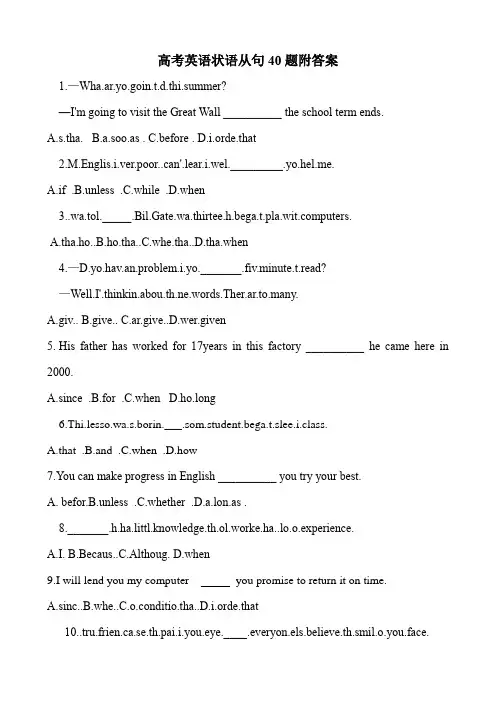
高考英语状语从句40题附答案1.—Wha.ar.yo.goin.t.d.thi.summer?—I'm going to visit the Great Wall __________ the school term ends.A.s.tha.B.a.soo.as.C.before.D.i.orde.that2.M.Englis.i.ver.poor..can'.lear.i.wel._________.yo.hel.me.A.if.B.unless.C.while.D.when3..wa.tol._____puters.A.tha.ho..B.ho.tha..C.whe.tha..D.tha.when4.—D.yo.hav.an.problem.i.yo._______.fiv.minute.t.read?—Well.I'.thinkin.abou.th.ne.words.Ther.ar.to.many.A.giv..B.give..C.ar.give..D.wer.given5.His father has worked for 17years in this factory __________ he came here in 2000.A.since.B.for.C.whenD.ho.long6.Thi.lesso.wa.s.borin.___.som.student.bega.t.slee.i.class.A.that .B.and .C.when .D.how7.You can make progress in English __________ you try your best.A.befor.B.unless.C.whether.D.a.lon.as.8._______.h.ha.littl.knowledge.th.ol.worke.ha..lo.o.experience.A.I.B.Becaus..C.Althoug.D.when9.I will lend you my computer you promise to return it on time.A.sinc..B.whe..C.o.conditio.tha..D.i.orde.that10..tru.frien.ca.se.th.pai.i.you.eye.____.everyon.els.believe.th.smil.o.you.face.A.whil..B.becaus..C.befor..D.until11.Th.movi.i..grea.success._________.it'.no.ver.good.A.s..B.bu..C.althoug..D.and12.Jac.was’.sayin.anything,bu.th.teache.smile.a.hi.. h.ha.don.somethin.ver.clever.A.in caseB.as ifC.wileD.though13.I.th.exam.th._______.yo.are.th.______.mistake.yo.wil.make.A.careful.littl..B.mor.careful.fewes..C.mor.careful.fewe..D.mor.careful.less14.Thi.i.a.interestin.book...... I’l.bu.it... .A.ho.muc.ma.i.cos..B.howeve.i.ma.cos.C.ho.ma.i.cos....D.n.matte.ho.i.ma.cos.15.Today we will begin we stopped yesterday so that no point will be left out.A.whenB.whereC.howD.what16.—Does Ted tell you if he __________ next Sunday?—No.h.doesn't.Bu.i.h.________.I'l.giv.yo..ring.e...e..e17.Th.bu.drive.alway.say.t.u.,“Don'.ge.off_______.th.bu.stops.”A.whe...B.whil.....unti...D.i.18.Yo.spea.i..lo.voice.Danny.Pleas.spea.loudl.____..ca.hea.yo.clearly.A.thoug..B.s.tha..C.bu..D.unless19.____ you keep on trying, I really don’t mind whethe.you can come up top in your class.A.As long asB.Even thoughC.As soon asD.The moment20..Yesterda.ther.were ... .man.peopl.i.th.par.... .almos.los.m.way..I.wa.th.Ma.Da.holiday.Lot.o.peopl.wante.t.hav.fu.there.A.quite.that .B.very.tha.C.enough.that .D.so.tha.21..won'.believ.you__..hav.see.i.wit.m.ow.eyes...A.befor..B.unti..C.afte..D.when22.Some people are holding their umbrellas ____ it is raining.A. in caseB.so thatC.as thoughD.unless23.—We'l.g.fo..picni.i.i._______.thi.Sunday.— Wish you a lovely weekend.A.rai..B.rain..C.won'.rai..D.doesn'.rai.24.—You speak _____ fast _____ we can’t follow you.—I will speak slowly.A.so.that .B.such.tha.C.suc.a.tha.D.too.to25.Sh.__.hom.__.sh.wa.satisfie.__.hi.answe.yesterday...A.didn'.go.until.t....B.wasn'.g o.after.t...C.doesn'.go.before.wit..D.didn'.go.until.with26.There are always ____interesting stories in the series that ___ many people watch them.A. so.so .B.such.suc..C.such.so ..D.so.such27.we won’t change our plan, it rains.A.becaus..B.sinc..C.a.i.D.eve.i.28.Yo.shoul.finis.you.lesson.______.yo.g.ou.t.play.A.befor.B.afte.C.whe.D.while29.Projec.Hop.ha.raise.muc.mone._________.th.poo.childre.ca.g.t.school.A.because.B.s.tha..C.i.orde.to.D.though30.Teres.i._______.nervou._______.sh.can'.tal.i.fron.o.th.class.A.such.tha..B.too.t..C.so.tha..D.too,that31.These days the long TV play is popular my mother often keep watching it for twohours without a rest a day .A.such.that .B.to..t..C.ver..that .D.s..that32.Th.meetin.didn'.start__.everyon.wa.there.A.becaus..B.unti..C.wh..D.if33.Stayin.i..hote.cost.... rentin..roo.i.a.apartroo.fo..week.A.twice as more asB.as more twice asC.twice as much asD.as much twice as34.H.too.of.hi.coa.______.h.fel.hot.A.becaus.B.a.C.i.D.since35._________.afte.th.dail.har.work.M.Ya.wa.hungr.fo.books.A.Tire.a.wa.h..B.A.tire.h.wa..C.A.h.wa.tire..D.Tire.a.h.was36.Whe.yo.rea.th.book.you’.bette.mak..mar.______.yo.hav.an.questions.A.whic.B.tha.C.wher.D.though37._________ hamburgers are junk food, __________ many children like them.A.Although...B.Although.bu..C.Because...D.Because.so38.Literature must consist of words, music sonsist of sounds.A.even thoughB.so thatC.just asD.even sincet.fo.clas.yesterda.______.ther.wa.somethin.wron.wit.m.bike.A.whe.B.tha.C.unti.D.because40..Th.docto.tol.m.no.t.ea.to.much.bu..foun.i.difficult.—Th.docto.i.right.________.yo.eat._____.yo.wil.be.A.Th.less.th.healthie...B..Th.less.th.mor.healthilyC.Th.more.th.healthie..D.Th.more.th.mor.healthily1~5BBDCA 6~10ADCCA11~15CBCBB 16~20ACBAD21~25CADAD 26~30CDABC31~35DBCAD 36~40CACDA。
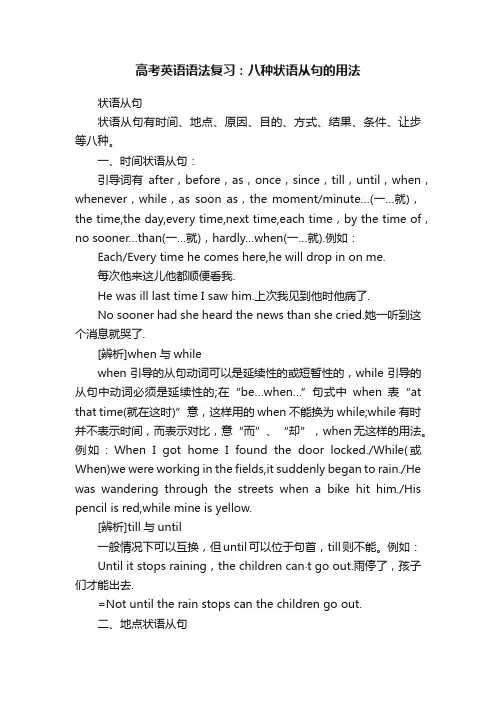
高考英语语法复习:八种状语从句的用法状语从句状语从句有时间、地点、原因、目的、方式、结果、条件、让步等八种。
一、时间状语从句:引导词有after,before,as,once,since,till,until,when,whenever,while,as soon as,the moment/minute…(一…就),the time,the day,every time,next time,each time,by the time of,no sooner…than(一…就),hardly…when(一…就).例如:Each/Every time he comes here,he will drop in on me.每次他来这儿他都顺便看我.He was ill last time I saw him.上次我见到他时他病了.No sooner had she heard the news than she cried.她一听到这个消息就哭了.[辨析]when与whilewhen引导的从句动词可以是延续性的或短暂性的,while引导的从句中动词必须是延续性的;在“be…when…”句式中when表“at that time(就在这时)”意,这样用的when不能换为while;while有时并不表示时间,而表示对比,意“而”、“却”,when无这样的用法。
例如:When I got home I found the door locked./While(或When)we were working in the fields,it suddenly began to rain./He was wandering through the streets when a bike hit him./His pencil is red,while mine is yellow.[辨析]till与until一般情况下可以互换,但until可以位于句首,till则不能。
2.(2024课标卷)34. You have to move out of the way the truck cannot get past you.A. soB. orC. andD. but【答案】B【解析】考查并列连词。
上下文存在着逻辑上的条件关系,所以用“or”意为“否则的话”。
句意:你得挪一挪位置,否则卡车过不去。
4.(2024北京卷)21.—Look at those clouds!—Don’t worry. ______ it rains, we’ll still have a great time.A. Even ifB. As thoughC. In caseD. If only【答案】A【解析】考查状语从句。
even if 即便,as though好像,in case 以防,if only要是…...多好啊。
句意:—看看那些云!—不用担忧。
即使下雨,我们也会玩得很快乐的。
5.(2024天津卷)14.Everything was placed exactly ___________he wanted it for the graduation ceremony.A. whileB. whenC. whereD. though【答案】C【解析】考查状语从句。
地点状语从句。
句意:毕业典礼所须要的东西都被放在了他想放的地方了。
7.(2024上海卷)40.The map is one of the best tools a man has _ _ he goes to a new place.A. wheneverB. whateverC. whereverD. however【答案】A【解析】考查状语从句。
从句中有“地点a new place”作宾语,故解除BC选项。
很明显本句是时间状语从句。
句意:一个人无论什么时候到了一个新地方,地图就是他运用的最好的工具之一。
8.(2024重庆卷) 30.—Coach, can I continue with the training?—Sorry, you can’t ______you haven’t recovered from the knee injury.A. untilB. beforeC. asD. unless【答案】C【解析】考查状语从句。
高考英语语法词汇专项突破:04条件状语从句考点扫描+巩固练习+答案(Adverbial clause of condition)【考点导航】【考例1】(2019·天津卷)Tom is so independent that he never asks his parents' opinion _________ he wants their support.A. sinceB. onceC. unlessD. after答案与解析:C。
考查连词辨析。
句意:汤姆是如此独立,以至于他从来不征求父母的意见,除非他想得到他们的支持。
since由于;once一旦;unless除非;after在……之后,依据题意,故选C。
【考例2】(2018年北京)_________ we don’t stop climate change, many animals and plants in the world will be gone.A.AlthoughB.WhileC. IfD.Until答案与解析:C。
考查状语从句。
句意:假如我们不阻挡气候变化,那么世界上的很多动植物都将会消逝。
动植物不灭亡的前提条件是阻挡气候变化。
although尽管;while当……时候,尽管,然而;if假如;until直到。
故C选项正确。
【考例3】(2018年江苏)_______ you can sleep well, you will lose the ability to focus, plan and stay motivated after one or two nights.A. OnceB. UnlessC. IfD. When答案与解析:B。
考查连词词义辨析及语境理解。
句意:除非你睡得好,否则一两个晚上之后,你会失去专注、方案和保持动力的力量。
A. Once一旦;B. Unless除非;C. If假如;D. When当……时候。
高考英语语法专项状语从句一.定义: 在句中作状语的从句就叫做状语从句二.考点透析【考点1】时间状语从句: 由when, while, as, before, after, since, till / until, as soon as等引导eg. I shall tell him the good news when he comes.【考点2】原因状语从句: 由because, as, since, for等引导eg.. He didn’t hear me because he was listening to the radio. ,eg. Since you are free today, you had better show me how to use the computer.【考点3】地点状语从句: 由where等引导eg. Please put the book where it was after you finish reading it.【考点4】条件状语从句: 由if, unless等引导eg.I will come to see you if I have time on Sunday.【考点5】比较或方式状语从句: 由than, as, as if, as...as...等引导eg.. I know you do better than he does.eg.. The old worker runs very fast as if he were a young man.【考点6】.目的状语从句: 由so that, in order that等引导eg.. They set out early so that they could arrive at the station in good time.【考点7】结果状语从句: 由so, so that, so / such...that...等引导eg.. They set out early so that they arrived at the station in good time.eg.. He finished his work so well that the boss praised him in public.【考点8】让步状语从句: 由though / although, even if, whatever, whoever, whenever, no matter what / who等引导eg.. He is in very good health though he is old.eg.. They didn’t stop working even if it began to rain hard.三.应注意的问题:1.时间和条件状语从句中常用一般时代替将来时a. I will go and see a film if I have time tomorrow.b. I will tell the about it as soon as he comes back.c. He said he would go out for a walk when he finished his work.2.状语从句中可有省略: 在一个含有状语从句的复合句中, 如果主句和状语从句的主语相同, 或状语从句的主语是it, 并且状语从句的谓语含有be动词时, 可以将状语从句的主语和b e一起省略掉a. As (she was ) a child, she began to learn English.b. If ( he was ) alive, he must be at least ninety years old.c. Although ( he was ) told to stop, he kept on working.d. If ( it is) necessary, ring me up.e. He didn’t say a single word until ( he was ) asked.3.as和than引导的比较状语从句中, 从句中和主句中相同的部分往往省略, 从句中只剩下比较对象a. He is a head taller than I ( am tall ).than之后的人称代词是主格或宾格时, 有时意思不同, 如:a. She likes the dog more than me.=She likes the dog more than she likes me.她喜欢狗比喜欢我更多b. She likes the dog more than I.=She likes the dog more than I like the god. 她比我更喜欢狗4.含有no sooner…than…和hardly / barely / scarcely …when…的句子相当于含有as soon as…引导的时间状语的句子. no sooner或hardly放在句首时, 主谓要部分倒装a. He had no sooner seen the policeman than he ran away. =No sooner had he seen the policeman than he ran away. =He ran away as soon as he saw the policemen.b. He had hardly sat down when the telephone rang. =Hardly had he sat down when the telephone rang. =The telephone rang as soon as he sat down.5.immediately, directly, instantly等词也可以作为连词引导时间状语从句, 相当于as soon as引导的时间状语a. I went to see him immediately I heard from him. =I went to see him as soon as I heard from him.6.the moment, the minute, the second,t引导时间状语从句, 相当于as soon as引导的时间状语a. He let out a cry the moment he saw the snake.=He let out a cry as soon as he saw the snake.7.each time, every time, any time, last time, next time, first time可以引导时间状语从句a. They shake hands with each other each time they meet.8.since引导的时间状语从句中, 若谓语动词是延续性动词或状态动词, 则其过去时表示动作的完成或状态的结束a. It is five years since he lived here. 他不住这里己有五年了a. They shake hands with each other each time they meet.9.in case引导的状语从句根据语境的不同,in case既可表示“如果”“万一”,引导条件状语从句;也可表示“以防(万一)”,引导目的状语从句。
下面两道真题均选in case:1. Leave your key with a neighbor ______ you lock yourself out one day. (北京卷)A. ever sinceB. even ifC. soon afterD. in case2. My parents live in a small village. They always keep candles in the house ______ there is a power cut. (重庆卷)A. ifB. unlessC. in caseD. so that10.before引导的状语从句尤其要注意“it+be+一段时间+before…‖这一句型。
如:1. The field research will take Joan and Paul about five months; it will be a long time ______ we meet them again. (安徽卷)A. afterB. beforeC. sinceD. when2. He was told that it would be at least three more months ______ he could recover and return to work. (江西卷)A. whenB. beforeC. sinceD. that11.when引导的状语从句对于when的用法,同学们最熟悉的是表示―当……的时候‖。
如:—Where’s that report?—I bro ught it to you ______ you were in Mr. Black’s office yesterday. (北京卷)A. ifB. whenC. becauseD. before【解析】答案选B。
将四个选项逐一填入空格处,只有填when时,意思最通顺。
句意为:当你昨天在布莱克先生办公室时我就带给你了。
但是when还有一个用法,就是表示―既然‖。
如:Why do you want a new job ___D___ you’v e got such a good one already?A. thatB. whereC. whichD. when还有一点也需注意,就是when表示“这时(突然)‖的用法。
如:1. I had just stepped out of the bathroom and was busily drying myself with a towel ___B___ I heard the steps. (湖南卷)A. whileB. whenC. sinceD. after2. He was about halfway through his meal ___C___ a familiar voice came to his ears. (辽宁卷)A. whyB. whereC. whenD. while11.unless引导的状语从句unless的意思是“如果不……”“除非”,对于涉及unless的考题,一般只要能读懂句意,弄清语境,一般不会有问题。